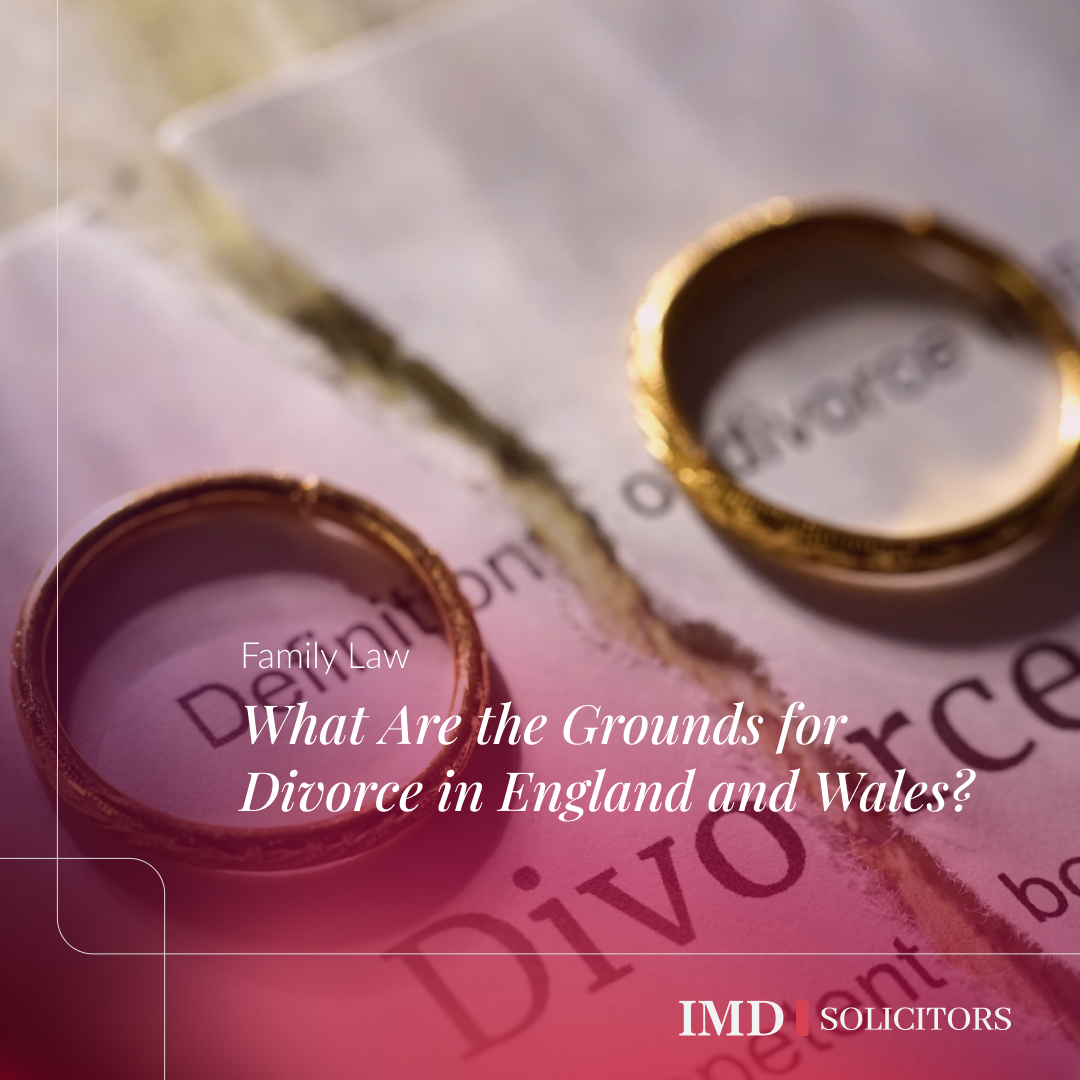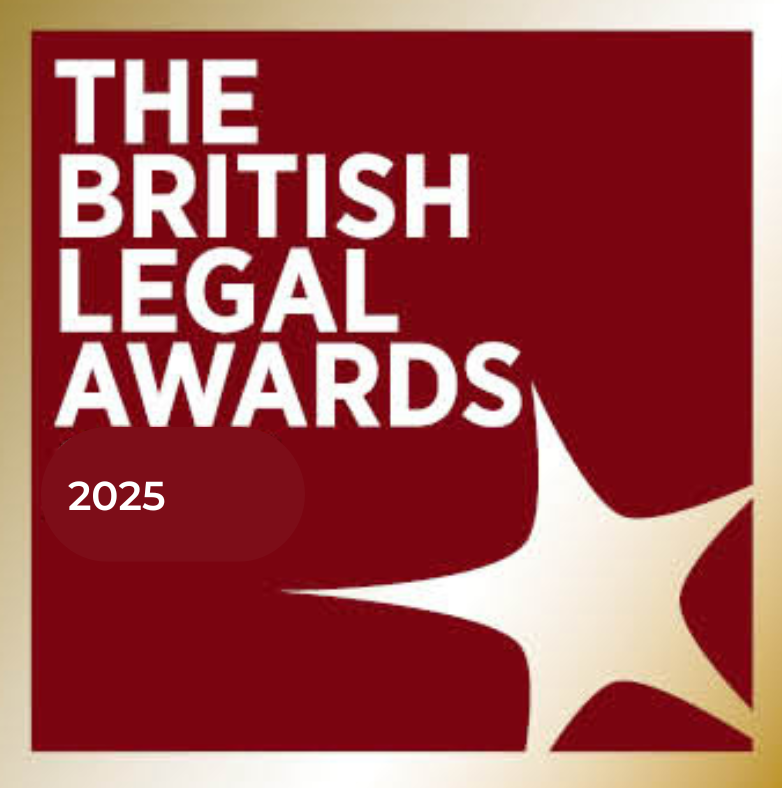What Are the Grounds for Divorce in England and Wales?

Speak to a member of our specialist international team of UK family lawyers today on 0330 107 0107.
What are the grounds for divorce in England and Wales? Since April 2022, there has been one clear answer. The Divorce, Dissolution and Separation Act 2020 introduced a single legal ground: that the marriage has broken down irretrievably.
At IMD Solicitors LLP, our family law solicitors advise clients across England and Wales on all aspects of divorce. We ensure every stage of the process is managed accurately, with a focus on securing fair and durable outcomes
The Legal Ground for Divorce
There is now only one ground for divorce: irretrievable breakdown of the marriage. The applicant, or both spouses jointly, must provide a statement confirming this and the court must treat that statement as conclusive evidence.
The reform replaced the previous commonly known five grounds: adultery, unreasonable behaviour, desertion, two years’ separation and five years’ separation. These former evidential requirements often led to conflict and delay. The current system removes the need to assign blame and reflects the reality that some marriages end through agreement, gradual disengagement rather than fault.
According to the Ministry of Justice, the reform was introduced “to reduce conflict between separating couples” and to promote a process that “supports better outcomes for families.” It aligns with modern family law principles that prioritise cooperation and focus on practical resolution rather than fault-finding.
The Divorce Process
The usual process begins with an online application through the official gov.uk service. Once the court accepts the application, it issues an acknowledgment to the other spouse. A statutory 20-week reflection period follows. This period, was designed to allow couples “time to reflect and agree practical arrangements before a final order is made” and is commonly referred to as the “cooling off” period.
After 20 weeks, the applicant may apply for a Conditional Order (previously the Decree Nisi). This confirms that the court accepts the marriage has broken down. Following a further six weeks, the applicant can then. apply for a Final Order (formerly Decree Absolute), which legally ends the marriage.
The timeline ensures that parties have sufficient opportunity to make informed decisions. During this time, many couples seek legal advice on finances, property, and children to secure a comprehensive settlement before the Final Order is granted.
Sole and Joint Applications
The law now allows either a sole application or a joint application. A sole application is made by one party, while a joint application is submitted by both together.
Joint applications often reduce hostility and help couples progress toward agreed outcomes on financial and child matters. However, a sole application remains available if cooperation is not possible and has little real impact on the divorce process. At IMD Solicitors LLP, we advise on which route best safeguards your position and manage all procedural steps.
Financial Matters After Divorce
A divorce ends a marriage, but not financial obligations. Without a separate financial order, claims over property, income, or pensions remain open. This can create uncertainty years after divorce.
Financial arrangements commonly include:
- Property and housing entitlements.
- Pensions, investments, and business interests.
- Maintenance and income provisions.
Our solicitors assist in full financial disclosure, negotiate settlements, and draft consent orders for court approval. A formal order provides finality and enforceability, protecting both parties against future claims.
Child Arrangements
Where children are involved, their welfare remains the court’s primary concern under the Children Act 1989. Parents are encouraged to agree practical arrangements for residence, time, and decision-making.
Our solicitors support constructive discussions and the preparation of Parenting Plans or Child Arrangements Orders where necessary. The objective is to achieve stability and continuity for the children while maintaining workable arrangements for both parents.
Why Legal Advice Remains Important
Although the process for divorce appears straightforward, the implications are significant. Divorce affects property ownership, pension rights, inheritance, and long-term financial security. Mistakes or omissions can have lasting consequences.
Professional advice ensures that documents are prepared correctly, deadlines are observed, and settlements reflect accurate financial information. It also assists in strategic planning — for example, delaying the Final Order until financial matters are finalised to preserve spousal benefits or pension entitlements.
Legal advice is particularly necessary where:
- There are international assets or cross-border interests.
- Business ownership or trust structures complicate valuation.
- One party is financially dependent on the other.
Our solicitors identify potential issues early, negotiate fair outcomes, and prepare precise documentation to prevent future disputes.
International and Cross-Border Divorce
Where a marriage involves property, residence, or assets in more than one country, jurisdictional issues arise. The court must determine whether England and Wales is the appropriate forum.
IMD Solicitors LLP frequently acts in international cases involving the recognition of foreign marriages and enforcement of overseas orders. We coordinate with foreign counsel to ensure consistent advice and enforceable outcomes under both domestic and international family law frameworks.
Expertise at IMD Solicitors LLP
Our role extends beyond completing forms. We manage the process from start to finish, ensuring procedural compliance and strategic protection. We:
- Advise on jurisdiction and preliminary matters.
- Handle financial disclosure and settlement drafting.
- Support discussions regarding children and parental agreements.
- Prepare and file consent orders for court approval.
- Represent clients in mediation or court proceedings where necessary.
Our team is recognised in The Legal 500 for professionalism and practical expertise in family law, including complex international matters. Clients value our precision, communication, and results-driven approach.
Conclusion
The only ground for divorce in England and Wales is the irretrievable breakdown of the marriage. This single, no-fault basis marks a shift toward clarity and cooperation. Yet, despite procedural simplification, the legal and financial implications remain extensive.
At IMD Solicitors LLP, we provide clear, structured guidance throughout the process. We protect your interests, secure fair outcomes, and ensure all matters are handled efficiently and lawfully. If you are considering divorce or separation, seek early legal advice. Contact IMD Solicitors LLP to arrange a confidential consultation with a member of our family law team.



















